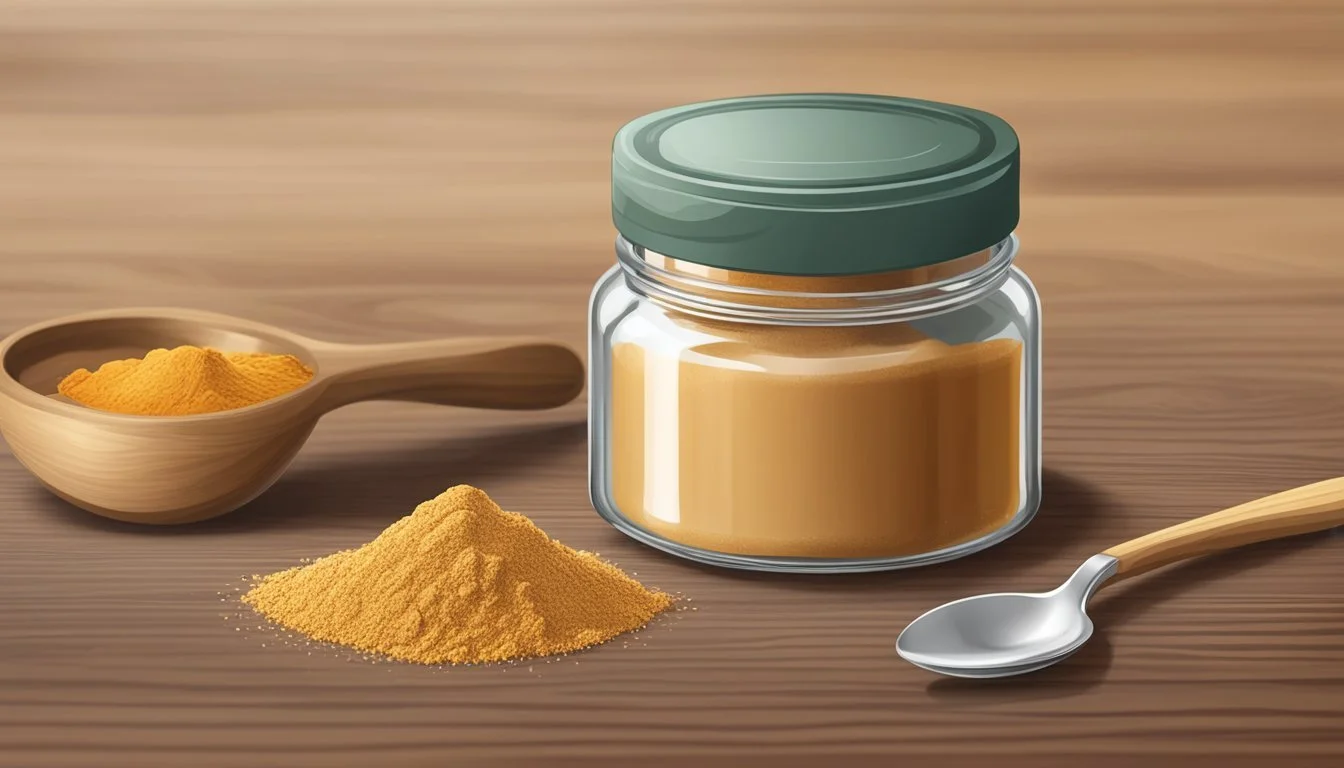Cordyceps Mushroom Powder Substitutes
Top Alternatives for Health Benefits
Cordyceps mushroom powder has become a popular supplement, especially among those seeking natural health boosters derived from traditional Chinese medicine. This unique fungus, specifically Cordyceps militaris and Cordyceps sinensis, is renowned for its potential health benefits such as enhancing energy levels, improving immune function, and exhibiting anti-inflammatory properties. For those looking to explore substitutes for Cordyceps, there are various alternatives that offer similar nutritional benefits and enriching flavors.
Shiitake mushroom powder, for instance, is praised for its high copper and vitamin B5 content, and it also features anti-cancer and anti-inflammatory properties. Similarly, reishi and chaga mushrooms provide distinct advantages, making them viable options for those who may be sensitive to Cordyceps or simply want to diversify their mushroom supplements. Additionally, blends like MUD\WTR combine multiple mushrooms including reishi, chaga, and cordyceps to support energy levels and overall wellness, without the caffeine of traditional coffee.
Whether you're seeking to enhance your diet with natural supplements or looking for a caffeine-free coffee alternative, mushroom powders can play a pivotal role. Cordyceps and its substitutes are versatile in usage, from beverages like mushroom coffee to adding a nutritious boost to various recipes. By exploring these alternatives, individuals can find the best option tailored to their specific health needs and taste preferences.
Understanding Cordyceps
Cordyceps, a genus of parasitic fungi, is notable for its diverse health benefits and historical use in traditional Chinese medicine. The upcoming sections present key information on its varieties, medicinal history, and active compounds.
Botanical Profile and Varieties
Cordyceps mainly include Cordyceps sinensis and Cordyceps militaris. Known for parasitizing insects, they grow primarily as mycelium within their hosts. Cordyceps sinensis is found in the mountainous regions of China and Tibet, while Cordyceps militaris is more widely distributed across Asia, Europe, and North America.
These medicinal mushrooms are recognized for their intricate lifecycle, culminating in fruiting bodies that sprout from the insect hosts. Cordyceps species are classified as "entomopathogenic fungi."
Historical Use in Medicine
First documented in AD 620, Cordyceps has been integral to traditional Chinese medicine. It has been traditionally used to improve energy, lung function, and kidney health.
It served as a lung and kidney tonic, aiding respiratory complaints and physical fatigue. Additionally, Cordyceps has been reputed to enhance sexual function and boost libido. These traditional uses underscore its revered status in historical medicinal practices.
Active Compounds and Effects
Cordyceps contains several bioactive compounds, including cordycepin, adenosine, and polysaccharides. Cordycepin is noted for its anti-inflammatory and antioxidant properties. Adenosine supports energy transfer within cells and has potential cardiovascular benefits.
Polysaccharides enhance immune system function and overall vitality. These compounds contribute to the mushroom's numerous health benefits, such as improved energy levels, better oxygen utilization, and enhanced immune response.
These varied effects underpin the continued interest and study of Cordyceps in modern science and health supplements.
Health Benefits of Cordyceps
Cordyceps mushrooms offer several key health benefits, including improving energy and exercise performance, supporting lung function and respiratory health, and boosting the immune system. Scientific research and traditional uses provide insights into the potential medicinal properties of this unique fungus.
Energy and Exercise Performance
Cordyceps are known for their potential to enhance energy levels and improve physical performance.
Studies show that these mushrooms can increase ATP production, which is essential for cellular energy. This can lead to improved stamina and reduced fatigue during exercise.
Evidence suggests that cordyceps may benefit both older adults and younger individuals by enhancing oxygen utilization and increasing energy production.
Despite these promising results, they don't seem to offer the same benefits to highly trained athletes.
Lung Function and Respiratory Health
Cordyceps have been traditionally used to support lung health and improve respiratory function.
Their anti-inflammatory and antioxidant properties help reduce inflammation in the airways, potentially easing symptoms of asthma and other respiratory conditions. This makes them valuable for maintaining overall lung health.
Some studies indicate that they may improve oxygen uptake, which can be particularly beneficial for individuals with chronic obstructive pulmonary disease (COPD).
Immune System Boosting
Cordyceps are believed to enhance the immune system through their various bioactive compounds.
These mushrooms contain polysaccharides and other compounds that stimulate the activity of immune cells, such as macrophages and natural killer cells. This can help the body better defend against infections and diseases.
In addition to boosting immunity, cordyceps have potent antioxidant properties that protect cells from damage and support overall health.
Including cordyceps in a wellness regimen may provide a natural way to enhance immune function and promote good health.
Nutritional Profile of Cordyceps
Cordyceps mushrooms are packed with a variety of beneficial nutrients and bioactive compounds that contribute to their medicinal properties. These mushrooms contain essential vitamins, minerals, and unique bioactive components like cordycepin and adenosine.
Vitamins and Minerals
Cordyceps mushrooms are rich in vitamins and minerals that support overall health. They contain significant amounts of B vitamins, especially vitamin B12, which is crucial for nerve function and the production of red blood cells.
In addition to B vitamins, Cordyceps mushrooms provide vitamin D, which is essential for bone health and immune function. They also supply minerals such as copper, iron, and zinc. Copper assists in forming red blood cells and maintaining healthy bones and nerves. Iron is vital for carrying oxygen to muscles and other tissues, while zinc supports immunity and wound healing.
Bioactive Components
Cordyceps mushrooms contain several bioactive components that contribute to their health benefits. The most notable include cordycepin and adenosine. Cordycepin is known for its anti-inflammatory and anti-tumor properties. It helps in regulating immune responses and inhibiting abnormal cell growth.
Adenosine, another important component, supports cardiovascular health by improving blood circulation and acting as a natural anticoagulant. Polysaccharides found in Cordyceps mushrooms play a critical role in boosting the immune system and possess antioxidant properties.
These bioactive compounds make Cordyceps mushrooms beneficial for enhancing energy levels, improving respiratory function, and supporting overall vitality.
Potential Side Effects and Precautions
Cordyceps mushrooms are generally well-tolerated but may cause mild side effects in some people and interact with certain medications. Awareness of these potential issues is important for anyone considering adding cordyceps to their supplement regimen.
Common Adverse Reactions
Cordyceps is usually considered safe for most individuals. Taking 3-6 grams daily for up to a year is often well-tolerated.
Some users might experience mild side effects. These can include:
Nausea
Diarrhea
Dry mouth
Although rare, allergic reactions might occur. Symptoms could be:
Rashes
Itching
Swelling
Those with known allergies to mushrooms should exercise caution. In the event of severe reactions, discontinue use and seek medical attention promptly.
Interactions and Contraindications
Cordyceps can interact with several medications, potentially causing adverse effects.
Diabetes Medications: Cordyceps may lower blood sugar levels. Combining it with antidiabetic drugs (like metformin) may increase the risk of hypoglycemia.
Blood Thinners: Cordyceps might reduce the efficacy of blood-thinning medications, affecting their performance.
Individuals with autoimmune disorders should take caution. Cordyceps may stimulate the immune system, potentially exacerbating these conditions.
Consulting a healthcare provider before starting cordyceps, especially if taking other medications or having underlying health conditions, is advisable.
Cordyceps Mushroom Powder in Diet
Cordyceps mushroom powder can be seamlessly incorporated into various dishes and beverages, bringing nutritional benefits and an earthy flavor to your diet.
Integrating into Recipes
Cordyceps mushroom powder can be used creatively in cooking. It's perfect for adding to soups, stews, and stir-fries. The powder blends well with both savory and sweet dishes, enhancing the nutritional value without overpowering the taste.
For a nutritious breakfast, mix it into your oatmeal or yogurt. Smoothies and protein shakes are also excellent options. Start with a small amount to gauge the flavor impact and adjust as needed.
Beverages and Teas
Cordyceps powder is also popular in drinks. It can be added to hot beverages like teas and coffee. Mushroom coffee is especially trendy, offering a unique, earthy flavor profile while providing energy-boosting benefits.
To make Cordyceps tea, simply mix the powder with hot water or steep it with your favorite tea blend. For a richer experience, try adding it to herbal infusions or combining it with honey and lemon. This makes it easy to enjoy its medicinal properties throughout the day.
Substitutes for Cordyceps Mushroom Powder
Several alternatives can replace Cordyceps mushroom powder in both culinary and medicinal applications. These substitutes include other medicinal mushrooms, various adaptogens, and non-mushroom alternatives, each bringing unique benefits.
Similar Medicinal Mushrooms
Reishi, Shiitake, and Lion's Mane are excellent substitutes for Cordyceps due to their medicinal properties.
Reishi is renowned for its immune-boosting and stress-relief effects. It's often available as a powder, extract, or in capsules.
Shiitake contains polysaccharides like lentinan, which may help with immune function and inflammation. This mushroom is available dried or as a powder suitable for various recipes.
Lion's Mane supports cognitive function and nerve health. Common forms include powders and extracts.
These mushrooms fit well into a mushroom blend for those looking for a comprehensive superfood.
Other Adaptogenic Substitutes
Adaptogens like Ashwagandha, Rhodiola Rosea, and Maca Root are valuable alternatives to Cordyceps.
Ashwagandha is known for reducing stress and enhancing energy levels. It’s often used as a powder or in capsules.
Rhodiola Rosea helps combat fatigue and improve mental performance. This adaptogen appears frequently in extracts and capsules.
Maca Root supports stamina and overall energy. Available in powder form, it blends well into smoothies and other recipes.
These adaptogens serve as functional ingredients in both food and supplements, providing similar benefits to Cordyceps.
Non-Mushroom Alternatives
For non-mushroom substitutes, consider Cacao, Ginseng, and Matcha.
Cacao offers antioxidant properties and a rich flavor, suitable for snacks and mushroom coffee mixes.
Ginseng is widely known for boosting energy and supporting immune function. It comes in powder or extract forms.
Matcha provides a steady energy boost and rich antioxidant content. It’s perfect for adding to teas, lattes, or desserts.
These alternatives cater to different preferences, from taste to dietary needs, offering varied yet effective substitutes for Cordyceps mushroom powder.
Dosage and Consumption
Understanding the appropriate dosage and methods of consuming Cordyceps mushroom powder is crucial for optimizing its health benefits. This section provides detailed insights into recommended dosages, forms of consumption, and the timing and frequency of intake.
Recommended Dosages
The ideal dosage of Cordyceps mushroom powder depends on several factors, including the form of Cordyceps (e.g., Cordyceps sinensis or Cordyceps militaris), the intended health benefits, and individual characteristics such as age and weight. Typical dosages range from 1000 to 3000 mg per day.
Human studies suggest that 1 to 3 grams per day of powdered Cordyceps is safe and beneficial. Always consult a healthcare provider to tailor the dosage to personal health needs, especially when introducing any new supplement.
Forms of Consumption
Cordyceps mushroom powder can be consumed in various forms, including powders, capsules, and teas. Each form has its own advantages.
Powders can be added to smoothies, soups, or other foods, offering versatility in culinary applications. Capsules provide convenience and accurate dosing, ideal for those with a busy lifestyle. Teas are a traditional method for using Cordyceps and may offer comforting and warm consumption. Choose the form that best fits your routine and preference.
Timing and Frequency
The timing and frequency of Cordyceps consumption can affect its efficacy. Daily intake is generally recommended, with some sources suggesting doubling the dose for the first two weeks to help the body adjust.
It is often best to divide the dosage into 2-3 portions throughout the day. For example, taking Cordyceps in the morning and evening can provide sustained benefits. Always follow specific product guidelines and healthcare advice to maximize the benefits.
Buying Guide for Cordyceps Products
When purchasing Cordyceps products, understanding quality indicators and relevant certifications can ensure you are getting a high-quality supplement. Look for key features and certifications to make informed decisions.
Quality Indicators
Checking the source of the Cordyceps is crucial. Products should ideally use Ophiocordyceps sinensis or Cordyceps militaris, known for their high bioactive compounds. Organic and non-GMO certifications indicate clean cultivation practices, free from synthetic pesticides and genetically modified organisms.
Review the extraction methods. Quality extracts often use dual-extraction (hot water and alcohol). A higher extract ratio, like 100:1, suggests a concentrated product. Lab testing for purity and potency ensures the product contains the active ingredients in adequate amounts.
Certifications and Standards
Look for certifications such as USP (United States Pharmacopeia), which ensures the product meets high standards for safety and quality. cGMP (current Good Manufacturing Practice) certification indicates adherence to rigorous manufacturing processes.
Facilities should be NSF and SQF-certified, ensuring sanitary and controlled production environments. Vegan, gluten-free, and paleo labels cater to dietary restrictions and preferences. Third-party testing validation adds another layer of assurance for quality and safety.
Research and Studies
Cordyceps mushrooms have undergone extensive scientific investigation due to their substantial health benefits, notably in enhancing immune function and possessing anti-inflammatory properties.
Recent Scientific Findings
Recent studies have highlighted the bioactive compounds in Cordyceps, particularly cordycepin. Cordycepin has demonstrated promising anti-cancer and anti-inflammatory effects. Clinical trials indicate that Cordyceps can positively impact heart health by improving blood flow and reducing cholesterol levels. Additionally, the fungus has shown potential in enhancing athletic performance through increased stamina and oxidative capacity.
Another study focused on the ability of Cordyceps to modulate the immune system. Findings suggest significant enhancement of natural killer cell activity, aiding in the body’s defense mechanisms. Using sophisticated techniques like NMR metabolic profiling, researchers have assessed the components' bioavailability and efficacy.
Ongoing Research
Current research aims to explore further the therapeutic potential of Cordyceps. Efforts are underway to evaluate Cordyceps' role in managing chronic diseases, such as diabetes and neurodegenerative disorders. Several clinical trials focus on understanding its long-term safety and effectiveness as a complementary therapy.
Studies are also concentrating on the production methods of Cordyceps, comparing natural and cultured varieties to ascertain bioactive compound efficacy. Researchers are interested in the potential synergistic benefits when combined with other medicinal plants, with hopes of developing novel integrative treatments for various health conditions.









